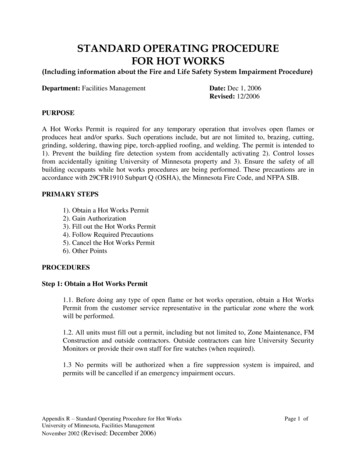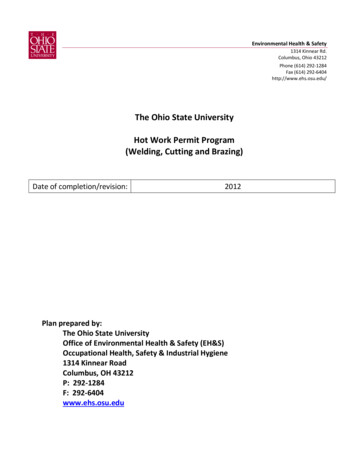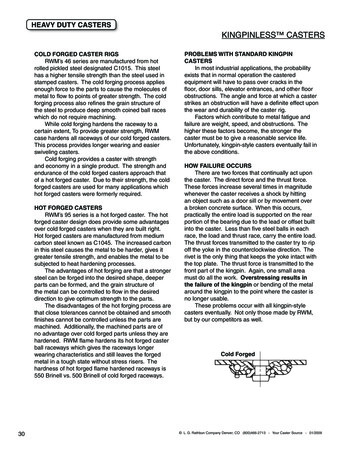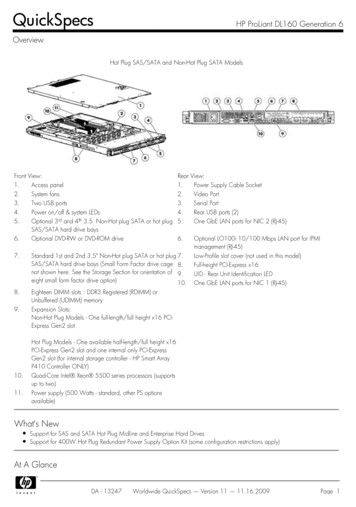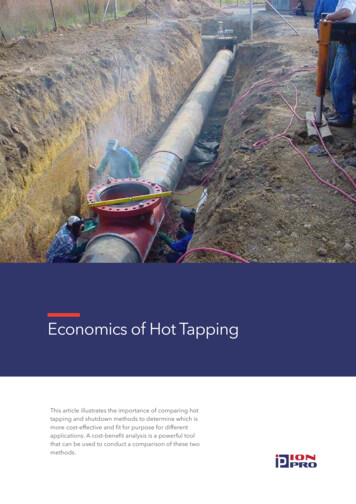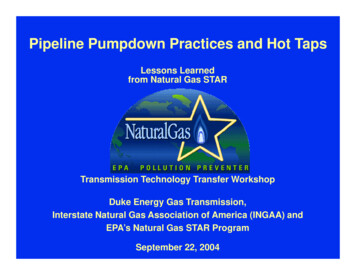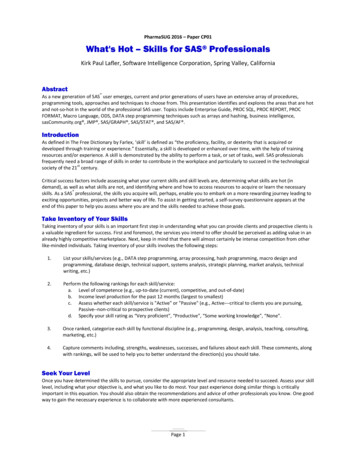
Transcription
PharmaSUG 2016 – Paper CP01What's Hot – Skills for SAS ProfessionalsKirk Paul Lafler, Software Intelligence Corporation, Spring Valley, CaliforniaAbstract As a new generation of SAS user emerges, current and prior generations of users have an extensive array of procedures,programming tools, approaches and techniques to choose from. This presentation identifies and explores the areas that are hotand not-so-hot in the world of the professional SAS user. Topics include Enterprise Guide, PROC SQL, PROC REPORT, PROCFORMAT, Macro Language, ODS, DATA step programming techniques such as arrays and hashing, business intelligence,sasCommunity.org , JMP , SAS/GRAPH , SAS/STAT , and SAS/AF .IntroductionAs defined in The Free Dictionary by Farlex, ‘skill’ is defined as “the proficiency, facility, or dexterity that is acquired ordeveloped through training or experience.” Essentially, a skill is developed or enhanced over time, with the help of trainingresources and/or experience. A skill is demonstrated by the ability to perform a task, or set of tasks, well. SAS professionalsfrequently need a broad range of skills in order to contribute in the workplace and particularly to succeed in the technologicalstsociety of the 21 century.Critical success factors include assessing what your current skills and skill levels are, determining what skills are hot (indemand), as well as what skills are not, and identifying where and how to access resources to acquire or learn the necessary skills. As a SAS professional, the skills you acquire will, perhaps, enable you to embark on a more rewarding journey leading toexciting opportunities, projects and better way of life. To assist in getting started, a self-survey questionnaire appears at theend of this paper to help you assess where you are and the skills needed to achieve those goals.Take Inventory of Your SkillsTaking inventory of your skills is an important first step in understanding what you can provide clients and prospective clients isa valuable ingredient for success. First and foremost, the services you intend to offer should be perceived as adding value in analready highly competitive marketplace. Next, keep in mind that there will almost certainly be intense competition from otherlike-minded individuals. Taking inventory of your skills involves the following steps:1.List your skills/services (e.g., DATA step programming, array processing, hash programming, macro design andprogramming, database design, technical support, systems analysis, strategic planning, market analysis, technicalwriting, etc.)2.Perform the following rankings for each skill/service:a. Level of competence (e.g., up-to-date (current), competitive, and out-of-date)b. Income level production for the past 12 months (largest to smallest)c. Assess whether each skill/service is "Active" or "Passive" (e.g., Active---critical to clients you are pursuing,Passive--non-critical to prospective clients)d. Specify your skill rating as “Very proficient”, “Productive”, “Some working knowledge”, “None”.3.Once ranked, categorize each skill by functional discipline (e.g., programming, design, analysis, teaching, consulting,marketing, etc.)4.Capture comments including, strengths, weaknesses, successes, and failures about each skill. These comments, alongwith rankings, will be used to help you to better understand the direction(s) you should take.Seek Your LevelOnce you have determined the skills to pursue, consider the appropriate level and resource needed to succeed. Assess your skilllevel, including what your objective is, and what you like to do most. Your past experience doing similar things is criticallyimportant in this equation. You should also obtain the recommendations and advice of other professionals you know. One goodway to gain the necessary experience is to collaborate with more experienced consultants.Page 1
What’s Hot – Skills for SAS Professionals, continuedPharmaSUG 2016Improve Skills/ExpertiseMany professionals believe they have already mastered all the necessary skills to be successful. But as technology evolves, itbecomes increasingly important to continue the process of learning, essentially evolving along with the areas you are pursuing.It may even involve splitting a large area of interest or endeavor into smaller pieces, a process known as specializing. Even if youconsider yourself an expert at what you do with interests and abilities in several areas in the SAS software, specialization isbecoming not only popular, but necessary. To assist with your skill building, consider additional training from the followingsources:1)SAS-led courses (lecture / hands-on workshops)2)Non-SAS Institute Instructor-led courses3)Self-paced computer-based training (CBT)4)Online SAS documentation in PDF and HTML format5)User-written books from SAS Press, Books by Users (BBU)6)“White” papers available from LexJansen.com, sasCommunity.org, support.sas.com, and other websites7)User Group presentations and Hands-on workshops8)Podcasts and webinars on sasCommunity.org and support.sas.comSAS professionals can improve or brush up on skills by attending instructor-led or hands-on workshop training courses. Trainingby experienced vendors is frequently available on a variety of topics and offered at local training centers and at conferenceevents. For example, the SAS Global Forum (SGF), the annual regional SAS conferences (e.g., MWSUG, NESUG, PNWSUG,SCSUG, SESUG, and WUSS), and industry-specific SAS conferences (e.g., PharmaSUG) offer affordable half-day and full-dayinstructor-led training. Users can attend these cost-effective training sessions before and/or after the conference event. Also,many of the conferences offer “free” 80 – 120 minute hands-on workshop sessions for users to attend during the conferenceevent. These can be very attractive ways to learn a topic of interest or brush up on the latest techniques from a leading expertin a hands-on environment.As an alternative to attending a training class in person, self-paced computer-based training (CBT) modules are available forpurchase or through subscription. From time to time, “free” limited trial access is available for evaluation purposes. All youneed to access this treasure-trove of information and learning is a computer and Web browser (e.g., Internet Explorer,Netscape Navigator, Safari or Mozilla FireFox). SAS Institute, for example, offers topics that can be accessed and studied for a90-day period on the Web.sasCommunity.orgsasCommunity.org is an exciting and new collaborative online community for SAS users worldwide. This virtual onlinecommunity supports technology for SAS users to collaborate with other users anywhere in the world; access SAS-based contentincluding blogs, presentations, and code examples; learn about upcoming events, forums and user group conferences; anddiscuss anything and everything that is related to SAS software, from SAS users to SAS users. As organizations experiencedeclining travel budgets, improved broadband and Internet technological advances, and a need for greater productivity,sasCommunity.org expands its presence among SAS professionals.SAS Certified Professional ExamsTo give your career a significant boost and to improve your prospects for success, the SAS Institute offers certification testingfor users in three key areas: 1) SAS Programming, 2) Predictive Modeling and 3) Data Warehousing. These globally recognizedcertification tests are administered in more than 140 countries by a global leader in testing services in the IT industry, and aretaken in a controlled environment.Two credentials are offered by SAS Institute for SAS programmers to consider:1) SAS Certified Base Programmer Credential for SAS 9a. SAS Base Programming Exam for SAS 92)SAS Certified Advanced Programmer Credential for SAS 9a. SAS Base Programming Exam for SAS 9b. SAS Advanced Programming Exam for SAS 9SAS Institute offers users a credential for predictive modelers to consider:1) Predictive Modeling Using SAS Enterprise Miner 5.2 Credentiala. Predictive Modeling Using SAS Enterprise Miner 5.2 ExamPage 2
What’s Hot – Skills for SAS Professionals, continuedPharmaSUG 2016Two credentials are offered by SAS Institute for SAS data warehouse professionals to consider:1) SAS Certified Warehouse Development Specialist Credentiala. SAS Advanced Programming Exam for SAS 9b. SAS Warehouse Technology Examc. SAS Warehouse Development Specialist Concepts Exam2)SAS Certified Warehouse Architect Credentiala. SAS Warehouse Technology Examb. SAS Warehouse Architect Concepts ExamSAS Alliance Partner ProgramSAS professionals may want to consider applying to become a SAS Alliance Partner. Five core programs are available to choosefrom: 1) Technology Program, 2) Consulting Program, 3) Application Program, 4) Outsourcing Program, and 5) Reseller Program.Each program has three levels: 1) Platinum, 2) Gold and 3) Silver. For more information about Alliance partnershipopportunities, prospective candidates should access and review the SAS Alliance Program Guide on the SAS Institute web site What Skills, Techniques and Websites are Hot?The following table illustrates many of the skillstechniques and/or websites, but not all, that the authors have found to bepopular and in demand by SAS professionals. Enterprise Guide – GUI point-and-click front-end applicationHash Programming Techniques to produce “Fast” table lookups, sorts, merges, and joinsOutput Delivery System (ODS) to create RTF, PDF, HTML, XML, and Excel outputODS Statistical Graphics to produce high-quality plots, bar charts, histograms, maps, and other graphicsPROC SQL to construct Queries, Tables, Views, Case Expression Logic, inner and outer JoinsPROC REPORT to create Detail and Summary ReportingMacro Language to construct Reusable Code and ToolsDictionary Tables and SASHELP Views – Access SAS Environmental / MetadataBusiness IntelligenceSAS University Edition software – Base-SAS, SAS/STAT, SAS/IML, SAS/ACCESS for Windows and StudioResource for Published SAS Papers – http://www.LexJansen.comSAS/XML – Share Structured Data as meta-dataTechnical Support, Online Documentation – http://support.sas.comSocial Networking, Blogs, Tech Support – http://www.sasCommunity.orgList Serve of archived Technical Support – SAS-L – http://www.listserv.uga.edu/archives/sas-l.htmlSAS Certification – SAS Certified Professional ExamsJMP software to produce Statistical and Data VisualizationJMP and JMP GenomicsWhat Skills are Not so Hot?The table below shows a few skills that the authors have found to be not as popular, or as they once were, by SAS professionals. SAS/ASSIST software SAS/FSP software SAS/AF software Screen Component Language (SCL)DATA NULL ‒ Monospace “Custom” ReportingPage 3
What’s Hot – Skills for SAS Professionals, continuedPharmaSUG 2016ConclusionThere are many avenues to help determine what skills are hot and what are not in the world of the SAS professional. Follow themain websites www.SAS.com, the forums and blogs within http://support.SAS.com and the user interchange onwww.sasCommunity.org to keep abreast of advancing technologies. Education and a desire to acquire new skills and experienceare very important. Careful planning, preparation, organization, the ability to handle multiple tasks, and diligence are importantfactors for any SAS professional to possess and/or develop.It’s also important to identify and acquire specific techniques from others, along with their successes and failures, to improvethe likelihood for greater success while enhancing your skills. Other professionals may be able to share their own expertise tohelp you acquire, or brush up on, specific skills, including resources like SAS-L, sasCommunity.org, and various web sitesdesigned for SAS professionals. These resources include instructor-led and hands-on workshop training available at SAS userconferences, self-paced computer based training (CBT) or e-Learning applications, self-study web resources including “white”papers, published programming tips and techniques, and certification. Also, a good SAS programming and/or user-writtentechnical book, or two, can provide a wealth of knowledge for the inquisitive, and self-starting, professional.ReferencesBarnes, Gregory S. (2000), "SAS Skills for the Next Millennium: A Geek Peek into the Not so Distant Future", Proceedings of theTwenty Fourth Annual SAS Users Group (SUGI) Conference - 2000.Holtz, Herman, How To Succeed as an Independent Consultant, John Wiley & Sons, Inc., 1983.Holtz, Herman, The Consultant’s Guide to Proposal Writing, Second Edition, John Wiley & Sons, Inc., 1990.Kishel, Gregory and Patricia Kishel, How to Start and Run a Successful Consulting Business, John Wiley & Sons, Inc., 1996.Lafler, Kirk Paul and Charles Edwin Shipp (2015), “What’s Hot, What’s Not – Skills for SAS Professionals”, Proceedings of thePharmaceutical SAS Users Group (PharmaSUG) Conference – 2015.Lafler, Kirk Paul and Charles Edwin Shipp (2014), “What’s Hot, What’s Not – Skills for SAS Professionals”, Proceedings of theSouth Central SAS Users Group (SCSUG) Conference – 2014.Lafler, Kirk Paul and Charles Edwin Shipp (2013), “What’s Hot, What’s Not – Skills for SAS Professionals”, PharmaSUG 2013; SanDiego SAS Users Group (SANDS) Meeting – March 2013; IowaSUG 2013; and NebraskaSUG 2013.Lafler, Kirk Paul and Charles Edwin Shipp (2012), “What’s Hot, What’s Not – Skills for SAS Professionals”, Proceedings of theMidWest SAS Users Group (MWSUG) Conference – 2012.Lafler, Kirk Paul and Charles Edwin Shipp (2011), “What’s Hot, What’s Not – Skills for SAS Professionals”, Proceedings of theSouth Central SAS Users Group (SCSUG) Conference – 2011.Lafler, Kirk Paul and Charles Edwin Shipp (2011), “What’s Hot, What’s Not – Skills for SAS Professionals”, Proceedings of the SASGlobal Forum (SGF) Conference – 2011.Lafler, Kirk Paul and Charles Edwin Shipp (2010), “Connect with SAS Professionals Around the World with LinkedIn andsasCommunity.org”, Proceedings of the Annual MidWest SAS Users Group (MWSUG) Conference – 2010.Lafler, Kirk Paul and Charles Edwin Shipp (2008), “What’s Hot, What’s Not – Skills for SAS Professionals”, Proceedings of theAnnual Western Users of SAS Software (WUSS) Conference – 2008.Lafler, Kirk Paul and Charles Edwin Shipp (2008), “Collaborate with SAS Users Around the World with sasCommunity.org”,ndProceedings of the 2 Annual SAS Global Forum (SGF) Conference – 2008.Lafler, Kirk Paul and Charles Edwin Shipp (2007), “Consulting: Critical Success Factors” – Awarded “Best Contributed Paper”,Proceedings of the Annual Western Users of SAS Software (WUSS) Conference – 2007.Lafler, Kirk Paul and Charles Edwin Shipp (2001), “SAS Consulting: New Beginnings” – Awarded “Best Contributed Paper”,Proceedings of the Ninth Annual Western Users of SAS Software (WUSS) Conference – 2001.Nelson, Bob and Peter Economy, Consulting for Dummies, IDG Books Worldwide, Inc., 1997.Schiffman, Stephan, The Consultant’s Handbook, Adams Media Corporation, 1988.Shenson, Howard L. Shenson on Consulting, John Wiley & Sons, Inc., 1994, 1990.Shipp, Charles Edwin and Kirk Paul Lafler (1995), "Training in a World of Cost-Cutting and Downsizing", NESUG 1995; WUSS1995; and SESUG 1995.Shipp, Charles Edwin and Kirk Paul Lafler (1995), "Training in a World of Cost-Cutting and Downsizing," - Awarded "BestContributed Paper", Proceedings of the Twentieth Annual SAS Users Group International (SUGI) Conference - 1995.Simon, Alan R., How to be a Successful Computer Consultant, Third Edition, Mc-Graw-Hill, Inc., 1994.The Free Dictionary by Farlex, http://www.thefreedictionary.com\skill, 2011.Page 4
What’s Hot – Skills for SAS Professionals, continuedPharmaSUG 2016Weinberg, Gerald M., The Secrets of Consulting, Dorset House Publishing, 1985.AcknowledgmentsThe author thanks Marlene Miller and David D’Attilio, Career Planning Section Chairs for accepting my abstract and paper; EricLarson, PharmaSUG 2016 Academic Chair; Sandra Minjoe, PharmaSUG 2016 Operations Chair; SAS Institute Inc.; and thePharmaSUG Executive Committee for organizing a great conference!Trademark CitationsSAS and all other SAS Institute Inc. product or service names are registered trademarks or trademarks of SAS Institute Inc. in theUSA and other countries. indicates USA registration. Other brand and product names are trademarks of their respectivecompanies.About the AuthorKirk Paul Lafler has used SAS since 1979, and is consultant and founder of Software Intelligence Corporation. He is a SASCertified Professional, provider of IT consulting services, trainer to SAS users around the world, UCSD Extension professor,mentor, and sasCommunity.org emeritus Advisory Board member. As the author of six books including Google SearchComplete! (Odyssey Press. 2014) and PROC SQL: Beyond the Basics Using SAS, Second Edition (SAS Press. 2013); Kirk haswritten more than five hundred papers and articles; been an Invited speaker and trainer at five hundred-plus SAS International,regional, special-interest, local, and in-house user group conferences and meetings; and is the recipient of 23 “Best”contributed paper, hands-on workshop (HOW), and poster awards.Comments and suggestions can be sent to:Kirk Paul LaflerSenior SAS Consultant, Application Developer, Data Scientist, Educator and AuthorSoftware Intelligence CorporationE-mail: KirkLafler@cs.comLinkedIn: http://www.linkedin.com/in/KirkPaulLaflerTwitter: @sasNerdPage 5
What’s Hot – Skills for SAS Professionals, continuedPharmaSUG 2016SAS Professional Skills SurveySAS Professional:E-mail/LinkedIn:1. How long have you been using SAS? 1 Year2. How would you rate the level of your SAS expertise?1 – 5 YearsNoneNovice3. Have you been certified as a SAS Professional by passing the certification exam?4. Are you a SAS Alliance Partner? Yes6 – 10 Years 10 YearsIntermediateAdvanced (Expert)Yes NoNo If you answered ‘Yes’ to previous question, how long? Years5. What method(s) do you use to improve your SAS skills?CBTInstructor-led TrainingHands-on WorkshopsUser Group Presentations WebinarsComputer Based Training (CBT)support.sas.comSAS Press Books/eBooksSAS Online Documentationwww.lexjansen.comMOOCsPodcastsYouTube VideosOther6. Rate your SAS programming/skills in the following areas (0 None, 1 Novice, 2 Some Knowledge, 3 Very Good, 4 Expert):-Base SAS SAS ProgrammingSQL ProgrammingMacro ProgrammingDATA Step Hash ProgrammingOutput Delivery System (ODS)ODS Statistical GraphicsSAS/FSP , SAS/AF and SCLSAS Enterprise Guide (EG)SAS Debugging TechniquesBusiness IntelligenceStatistical ConsultingSAS/IntrNet SAS/PC SAS/Connect SAS/ETS SAS/OR SAS/Graph SAS/XML Data MiningData CleaningOtherOtherCurrently1-Year from Now2-Years from Now7. What makes your skills unique and/or successful?8. What are your goals, directions, and future plans?Please feel free to use this form to assess and manage your own SAS Skills.Figure 1. Professional SAS Skills SurveyPage 6
2) SAS Certified Advanced Programmer Credential for SAS 9 a. SAS Base Programming Exam for SAS 9 b. SAS Advanced Programming Exam for SAS 9 SAS Institute offers users a credential for predictive modelers to consider: 1) Predictive Modeling Using SAS Enterprise Miner 5.2 Credential a. Predictive Modeling Using SAS Enterprise Miner 5.2 Exam

